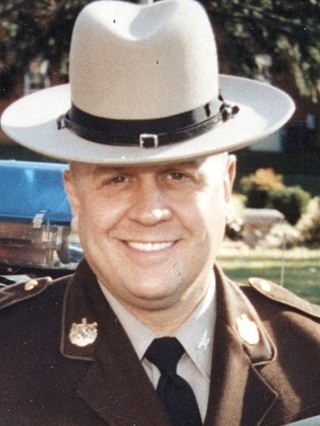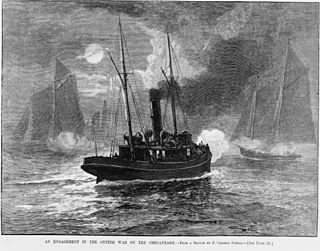Related Research Articles

Homicide: A Year on the Killing Streets is a 1991 book written by Baltimore Sun reporter David Simon describing a year spent with detectives from the Baltimore Police Department Homicide Unit. The book received the 1992 Edgar Award in the Best Fact Crime category.

The Montgomery County Police Department (MCPD), officially the Montgomery County Department of Police (MCP), is a nationally accredited agency and the primary law enforcement agency of Montgomery County, Maryland, providing the full spectrum of policing services to the entire county, including the Potomac River.

The Baltimore Police Strike was a 1974 labor action conducted by officers of the Baltimore Police Department. Striking officers sought better wages and changes to BPD policy. They also expressed solidarity with Baltimore municipal workers, who were in the midst of an escalating strike action that began on July 1. On July 7, police launched a campaign of intentional misbehavior and silliness; on July 11 they began a formal strike. The department reported an increase in fires and looting, and the understaffed BPD soon received support from Maryland State Police. The action ended on July 15, when union officials negotiated an end to both strikes. The city promised police officers a wage increase in 1975, but refused amnesty for the strikers. Police Commissioner Donald Pomerleau revoked the union's collective bargaining rights, fired its organizers, and pointedly harassed its members.

The Baltimore Police Department (BPD) is the municipal police department of the city of Baltimore, Maryland. Dating back to 1784, the BPD, consisting of 2,935 employees in 2020, is organized into nine districts covering 80.9 square miles (210 km2) of land and 11.1 square miles (29 km2) of waterways. The department is sometimes referred to as the Baltimore City Police Department to distinguish it from the Baltimore County Police Department.

The Maryland State Police (MSP), officially the Maryland Department of State Police (MDSP), is the official state police force of the U.S. state of Maryland. The Maryland State Police is headquartered at 1201 Reisterstown Road in the Pikesville CDP in unincorporated Baltimore County.

Edward T. Norris is an American radio host, actor and former law enforcement officer in Maryland. He is the cohost of a talk show on WJZ-FM in Baltimore, Maryland. Norris, a 20-year veteran of the New York Police Department, served as Police Commissioner for Baltimore from 2000 to late 2002 and Superintendent of the Maryland State Police in 2003. Norris played the eponymous detective Edward Norris in HBO's The Wire. In 2003, Norris was convicted of a felony and spent six months in federal prison.

In Iceland, the Police is the national police force of Iceland. It is responsible for law enforcement throughout the country, except in Icelandic territorial waters which fall under the jurisdiction of the Icelandic Coast Guard. Police affairs in Iceland are the responsibility of the Ministry of Justice and are administered by the Office of the National Commissioner of the Police on behalf of the ministry. The organisation is divided into nine districts, the largest being the Reykjavík Metropolitan Police, which is responsible for the Capital Region and its total population of around 208,000 people.

The Baltimore County Police Department is the primary law enforcement agency for Baltimore County, Maryland. They have been accredited by Commission on Accreditation for Law Enforcement Agencies (C.A.L.E.A.) since 1984.
The Baltimore Police Department plays an integral part in The Wire.

A baton is a roughly cylindrical club made of wood, rubber, plastic, or metal. It is carried as a compliance tool and defensive weapon by law-enforcement officers, correctional staff, security guards and military personnel. The name baton comes from the French bâton (stick), derived from Old French Baston, from Latin bastum.

The Maryland Natural Resources Police (NRP) is the law enforcement arm of the Maryland Department of Natural Resources (DNR), tasked with enforcing laws on the state's public lands and waterways, protecting fish and wildlife, and leading search and rescue efforts. The Natural Resources Police is also the state's maritime homeland security agency.
"-30-" is the series finale of the HBO original series The Wire. With a running time of 93 minutes, this tenth and final episode of the fifth season is the longest episode of the series. The episode was written by series creator/executive producer David Simon (teleplay/story) and co-executive producer Ed Burns (story). It was directed by Clark Johnson, who also directed the pilot episode and stars on the show. It aired on March 9, 2008. The episode's writers were nominated for the Primetime Emmy Award for Outstanding Writing for a Drama Series.

The Howard County Police Department (HCPD) is the primary law enforcement agency servicing 330,558 (20202) persons within the 254 square miles (660 km2) of Howard County, Maryland.
Donald D. Pomerleau was the commissioner of the Baltimore Police Department from 1966 to 1981.
Anthony W. Batts is an American law enforcement officer who served as the chief of three different police departments in the United States: The Long Beach, California Police Department, the Oakland, California Police Department, and the Baltimore, Maryland Police Department.
The United States police-rank model is generally quasi-military in structure. A uniform system of insignia based on that of the US Army and Marine Corps is used to help identify an officer's seniority.

The Oyster Wars were a series of sometimes violent disputes between oyster pirates and authorities and legal watermen from Maryland and Virginia in the waters of the Chesapeake Bay and the Potomac River from 1865 until about 1959.
James B. Chanin is an American civil rights attorney, based in Oakland, California. Chanin has been an attorney since 1978, and is best known for his representation of victims in the “Oakland Riders” case, and as one of the two plaintiffs’ attorneys in the Riders Negotiated Settlement Agreement (NSA). Although best known for his cases involving police misconduct, Chanin has also represented police officers and other police department employees.
On July 18, 2013, Tyrone West, a 44-year-old African American male, was pursued by two officers of the Baltimore Police Department after he fled a traffic stop during which cocaine was allegedly found. The cocaine later went missing in police possession after a subpoena was issued. West was on parole at the time of this incident with an extensive criminal record including assault, resisting arrest, and attempted first-degree murder. West ultimately died during the scuffle with police and various medical experts have given conflicting assessments of contributing factors including cardiac arrhythmia, dehydration, positional asphyxia, and extreme environmental temperatures.
Christopher Eric Bouchat is an American politician. He is a member of the Maryland House of Delegates for District 5, which encompasses Carroll County, Maryland. He was previously a member of the Carroll County Board of Commissioners from 2018 to 2022, representing District 4 in southwest Carroll County.
References
- 1 2 Federal Writers' Project, Maryland:A Guide to the Old Line State, p. 204, US History Publishers, ISBN 1-60354-019-9.
- 1 2 3 4 Nightstick Joe is back in business, The Baltimore Sun, September 23, 2000.